Failed US Economic Policies Lie Behind Current Geopolitical Tensions
When Economic Competition Turns Into Military Competition
Dear Readers,
Thank you to those who have been in touch with emails and video clips. I see them even if it takes a while for me to respond.
This piece may be a bit economics-heavy, but there is a reason for doing so. Almost all the public discourse around the wars and genocide is about events rather than causes.
Identifying the causes allows them to be addressed. I’m about done wringing my hands. Both wars must be ended. ___________________________________________________________________________
The middle of a war that is threatening to go nuclear and a genocide might seem a strange time to take a detour into economics. But the economics have bearing on the wars. The two-and-one-half World Wars of the last century each trailed periods of capitalist / imperialist expansion that were followed by crises. Several of the graphs below illustrate that, as was the case in the 1930s, the Great Recession caused a deeper and wider crisis of capitalism than has been admitted in the West.
Following the ethos, or zeitgeist if the term is more accurate, of his day, US president Joe Biden supported the policies--- the neoliberal iteration of free trade, that are now widely blamed for rising trade tensions between the US and China. What mainstream Western accounts miss about these epochs is that rising class tensions within and across nations has defined them as much as nationalism. It is in the political interest of national leaders to deflect blame for policies gone awry by blaming other nations.
Biden, representative of his time and place, likely had no concept of the implications of the trade policies that he supported (NAFTA, for one). The relevance of this in the present is that, without having understood the economic policies that he supported in the past, he has little to work with intellectually to tie his past actions to current trade tensions. The point: disappearing and / or misrepresenting the history--- for whatever reason, that brought events from past to present makes diagnosing problems and crafting workable solutions close to impossible.
While the following seems self-evident, it apparently isn’t. The economic advantage that China has lies in history, not supply and demand graphs. The Chinese studied what had worked economically, and what hadn’t, across the West and took what worked while leaving aside what didn’t. Logically, this speeds up of the process of capitalist development, or whatever form of government the people of China wish to claim. The US had the same opportunity that China did to revisit the history of capitalism. But Americans don’t ‘do’ history.
At the time that China was admitted to the WTO (2001), the US and China were in opposite corners in terms of conceptions of economic organization. The US was deep in the grip of ‘free-trade’ fever, the quasi-religious theory that societies are economically self-organizing given certain conditions. Unburdened by this particular religious leaning, the Chinese were free to plan roads leading between factories and ports, the organization of supply chains to minimize frictions, and how to develop the Chinese economy.
With respect to developing the Chinese economy, China joining the WTO was a watershed event that is addressed in more detail below. The point for present purposes is that the actions of the governments of both the US and China with respect to trading with one another were based in diametrically opposed conceptions of economic organization. Outside of class relations, the Chinese had no reason to care what the Americans did with the gains from trade with China, assuming that there were any.
What the Americans did was to fire four – five million industrial workers (graph below), leave one-third of the US to the ravages of economic decline, and put all of the gains from trade with China into the pockets of the oligarchs and business executives who sponsored NAFTA and China’s entry into the WTO (graphs below). China didn’t do this. What it did was to make the most of new access to US markets under the terms of membership in the WTO. By the time that the Biden-Harris administration was forced by political circumstance to put forward an implied industrial policy, ‘beat China,’ the US war with Russia was underway.
This breezy, if not terrifically uplifting, introduction is needed to frame the nature and targets of the critique. The hope and promise of the BRICS is that a different path of economic development can be found. But the division of the world into trading blocs has different meaning than their just coming into formation. The dissolution of an old order is underway. With a political party in the White House that is apparently too stupid to understand that lobbing missiles at Moscow is an act of war, the old order isn’t going to go quietly. Nor can it.
At present, it is the Americans who are threatening the world with nuclear annihilation. Guessing whether or not the Russians are bluffing with respect to the use of nuclear weapons would be clinically insane if the American political leadership had any idea what it was doing. But it doesn’t. Again, senior administration officials appear to have been surprised that the Russians objected to their bombing Moscow. The question of how they would react if Russia were to bomb Washington, DC has conspicuously never occurred to them.
In 2001 China was admitted to the WTO (World trade Organization). Shortly thereafter, between four and five million industrial workers in the US found themselves without jobs as a third of the US was being transformed into a dystopian hellscape by economic decline. As the facts have it, China followed standard capitalist development economics. The question to ask is why the Americans who supported the policy thought it was a good idea?
Graph: China was admitted to the WTO in late 2001. From that point forward manufacturing employment in the US fell in lock-step with the US Trade Balance with China. China was allowed to flood the US with low-priced consumer goods as part of its export-led growth strategy. Doing so made economic sense for China, but not for the Americans. The ‘temporary’ strategy by China was allowed to permanently displace US-based manufacturing. Units (L) USD, thousands, (R) persons, thousands, Source: St. Louis Federal Reserve, Census Bureau.
Part of the conceptual challenge for Americans in understanding what happened--- and why, comes from incessant state and commercial propaganda insisting that the US is a functioning state. In the rarefied environs of the people running the place, it is a functioning state. The rich in the US live as long as ordinary citizens do in peer nations (graph below). The poor in the US live 10 – 15 years less than the average in peer nations. The ‘political’ question then: is the worthy goal to extend the lives of the poor or to shorten the lives of the rich?
Off color joke with a point: Adolf Hitler was in the Fuehrer Bunker in the final days of the Third Reich when he looked around and asked, where in the fu*k did all of these Nazis come from? This is the US at present. Following five decades of planned deindustrialization, the lightbulb is suddenly turning on that, to the extent that the stuff that capitalism produces is needed, the US has jettisoned its capacity to produce it. The precise idiocy that motivated this logic--- that the US would be the ‘manager’ of the world and other nations would be ‘our’ workers, seemed just as stupid four decades ago as it is today.
However, calling policies stupid doesn’t get us very far. History has demonstrated that these policies benefitted the few and immiserated the many. The question then is how the American ruling class 1) concluded that deindustrialization was a good idea, and 2) how it convinced the rest of us to go along with their program? The answer to this relatively narrow formulation can be stated in one word: economics. The American ruling class bought Francis Fukuyama’s ‘End of History’ thesis because it placed them on the ‘winning’ side of history.
Graph: in 2001, the year that China was admitted to the WTO, the economic argument inside the US was that ‘free-trade’ was the quickest route to vast riches. In fact, the rate of Real GDP growth in the US has been declining since the Reagan Revolution. While there are complex historical reasons for the decline, the ideological endorsement of so-called free trade wasn’t qualified with historical exceptions. The claim was that it works, but it didn’t. At least not for those who weren’t rich at the outset. The GDP growth rate in the US has been falling for five decades now. Source: St. Louis Federal Reserve.
While Fukuyama is superficially the anti-Marx by claiming that history had ended, the concept of time that he was working with came from capitalist economics. Marx’s conception of history emerged from an unrelated conception of time. To repeat, these aren’t competing theories of time. They are unrelated. This point is brought to bear below in addressing economist Joan Robinson’s critique of the neoclassical Production Function. But the larger point is that capitalist economics is a belief system built upon a foundation of quicksand mixed with rusty nails.
This would all be academic if it were no more than academic. The Americans promoting wars are claiming an economic basis for the current conflicts--- economic competition with BRICS (Brazil, Russia, India, China, South Africa) countries. However, this competition isn’t discrete in the sense put forward. The US helped facilitate the economic rise of China motivated by a quasi-religious conception of international trade (‘free’ trade). The conceptual particulars were neoclassical, while the political economy they emerged from was neoliberal.
Briefly, neoliberalism is a version of l’etat, c’est moi (the state, it is I), or whatever benefits the rich and powerful, benefits ‘us all.’ Western economists don’t tend to be that clear on how neoclassical economics was a necessary precursor to neoliberalism. The ‘self-interest’ of neoclassical economics has one meaning in the context of dispersed power and another in the context of concentrated power. When the rich control the state, as has unambiguously been the case in the US over the last five decades, what benefits the rich becomes state policy.
Graph: from 2020 to 2024, four years in graph time, Corporate Profits in Nonfinancial Domestic Industries rose from $1.25 trillion USD to $2.85 trillion USD, a 128% increase. Depending on how inflation is being estimated, this rise in corporate profits could explain most or all of the current epoch of inflation is the US. What this means is that it wasn’t inflation at all. It is extortion committed by firms with pricing power combined with there being no one to stop them from doing so. This is evidence of the un-free trade for the rest of us that US ‘free-trade’ policies have wrought. Source: wolfstreet.com.
If there had been any period over recent decades when the political class in the West that was promoting ‘free-trade’ had asked 1) what is it? and 2) understood why, according to ordinary capitalist economics, the necessary conditions for it would be so onerous and intrusive that the neoliberal version would clearly be understood to be a fraud, US imperial decline might be on a gentler path today. Actual free trade requires institutional guardrails to prevent the rich and powerful from being ‘free’ to rob, abuse, and exploit the not-rich and the not-powerful. But that wasn’t the version that you heard, was it?
This practice of using partially and selectively realized economic policies to force political agendas ‘works’ through bait-and-switch. For instance, what is to be made of claims that millions of poor people have been lifted out of poverty by trade policies when the analyses stating so are missing credible deductions for what was lost in the process? Few would publicly object to the prior were it not for the latter. Simply ignoring relevant and related costs doesn’t make them disappear. But it does leave them to fester.
Graph: Life Expectancy at Birth, the most inclusive measure of life expectancy, is a strong indicator of the overall wellbeing of nations. Around 2008 something happened, likely economic in nature (Great Recession), that caused life expectancy to first flatten, and then to fall dramatically, relative to peer nations. American politicians claimed that the problems were quickly resolved and that the economy has fully recovered. However, Americans currently live five years less than the citizens of peer nations. What this implies is material societal decline for significant swaths of the US. The math doesn’t work any other way. Source: healthsystemtracker.org.
The political choice at present is to resign ourselves to accepting the consequences of this powerlessness, which now includes the very real threat of nuclear annihilation, or to find the social leverage needed to end the wars and restore functioning governments to the West. As the facts have it, a plurality, if not a majority, of Americans would jettison official Washington into deep space if we could. And the great mystery of why politicians in the US serve their donor’s interests, and not ours, has at last been solved. The answer: that is how the campaign finance system was set up to operate.
What neoliberalism did accomplish was to turn American imperialism inward. NAFTA and the so-called ‘free-trade’ policies of the 1990s and 2000s were / are critical turning points in an ongoing class war in the US. Put forward in the American press at the time (1994, 2001) was the idea that these policies would affect economic outcomes in other countries. And they do. But through class divisions inside the US, the policies were equally intended to keep the existing ruling class at the top of the economic heap.
By way of metaphor, as yours truly argued in the environmental realm most of a decade ago, piecemeal reforms open up space for malevolent actors to prevent needed changes from gaining political traction. Over subsequent years, the pundits promoting environmental reforms found the ear of the Biden administration. Proven-to-be-ineffective ‘tax incentives’ (executive bonus pool transfers) were passed. Then the US launched the most environmentally destructive war against Russia in human history.
The claim inside the US is always, always, always that if it hadn’t been for actual history, the American plan would have worked. Deep into the GFC (Global Financial Crisis), true believers on Wall Street continued to claim that if it hadn’t been for ‘government interference,’ the GFC wouldn’t have occurred. This argument emerged from ideology, from projection of how ‘the economy’ works in theory, not from history.
The logic of applying top-line definitions like ‘rich’ and ‘poor’ to nations may make sense for economically homogenous nations. But the US isn’t an economically homogenous nation. It is a few extremely rich people surrounded by an astonishingly large array of people who are no longer getting by. Life Expectancy (graph below) is currently five years less in the US than in peer nations. By this metric alone, the US is a failed state. Nations simply don’t experience the decline in Life Expectancy that the US has outside of severe social decline.
It took five decades of malign neglect to bring the US to its current state. The motivating logic, to the extent that any existed outside of (capitalist) religious fervor, was that the billionaires who ‘made’ their fortunes through inheritance and direct and / or indirect (e.g. military) Federal subsidies, didn’t want to pay taxes. When Bill Clinton ‘ended welfare as we know it’ in the mid-late 1990s, he didn’t end socially dubious subsidies like (consequence-free) Federal bailouts for Wall Street and favored industries like Big Tech. What he did was force the reserve army of the unemployed into labor markets to lower wages for his oligarch friends.
China’s economic development strategy of the last three decades, called ‘export-led growth,’ is premised on / in a capitalist conception of economic development. In this model, there are stages of development that nations go through on their way to American-style capitalist nirvana. In the early-stage, nations invest in capital equipment and organize their societies to produce goods for export to more developed countries. The profits from exports finance the build-out of broader economic production as the consumer societies needed to support this higher stage of capitalist development are formed.
In 2001 China was admitted to the WTO (graph above). This opened up Western markets to imported consumer goods from China. The move sent China’s export-led growth into overdrive. Those living in the US during these years will remember an avalanche, a veritable tsunami, of low-priced consumer goods from China suddenly flooding American stores. At the same time, manufacturing in the US imploded. Within a few years of China joining the WTO, four – five million manufacturing jobs in the US had disappeared.
In China, a large number of newly employed Chinese workers were lifted out of poverty by the policy. From China’s perspective, as well as from that of development economists, the export-led growth strategy 1) materially benefited a significant number of Chinese workers, and 2) supported the development economics that had been deployed by China to do so. Missing from the policy analysis was the loss of manufacturing jobs in the US. The workers in the US who lost jobs from the policy were not rich, even though rebalancing from rich to poor is part of the motivating logic of the policy.
Graph: while the future is unwritten, China’s efforts to date to create a consumer economy haven’t borne fruit. With GDP as the denominator, Investment (export-led growth) has risen as a percent of China’s GDP while Household Consumption has fallen. While in economic time, this may just signal steps in a process, it is impossible to ignore the geopolitical consequences. Failed politicians in the US are citing China to explain the growing catastrophe that is the US. This is why Western imperialism has boom and bust cycles. The politics eventually catch-up with the economics. Source: NBER.org.
In the early 1950s, an economist named Joan Robinson tried to unpack the metaphysics--- without calling it such, behind what is called a Production Function in capitalist economics. A Production Function is a conceptual tool created to help economists determine the optimal mix of labor and capital in economic production. The problem that Robinson ran into was that the variables in the Production Function exist in different time-space than the world outside of it, making its results misleading. Readers with an interest can go the link in this paragraph, the explainer on the ‘Cambridge Controversy’ here, and my book Zen Economics, in which I address the implausible premises of both capitalism and capitalist economics.
This in turn came down to competing conceptions of time that place economic analyses outside of history. Consider, the ‘comparative statics’ used by capitalist economists implies simultaneity---that once the conceit of static time is applied, all existents exist together in a static present that isn’t implied by history. This relationship is wholly invisible to anyone who hasn’t previously been introduced to it. Multivariate analyses, including the relationship between dependent and independent variables, simply assume that models developed from capitalist ideology capture the essential structure of the world.
Time invariance is the more improbable of the conceits here. Time invariance means that the data used by economists exists and acts independently from time, and with it, history. Consider China’s export-led growth strategy. There existed the economic theories that posited particular outcomes (economic development) from China’s policy. And those were the outcomes that were looked for. But what about the decimation of American manufacturing and the destruction-through-neglect of the American heartland? No one was looking for it, so it wasn’t found.
Graph: while politicians in the US have claimed that the Great Recession was ended while Barack Obama was still in office, political disaffection in the US has remained at crisis levels. In fact, Right Track / Wrong Track polling follows economic conditions reasonably well. What the graph indicates is that for poll respondents, economic conditions have been at crisis levels since the early hints of the housing bust started in 2006. Source: gallup.com.
Through the application of history, the premise of time invariance can be seen to be political. Within the premise, the world behaves as predicted (by design). Outside of it, chaos was the product of the policy choice and chaos reigns. China’s development program did what it was expected to do. But it also did a whole lot more. This may well be the fault of China’s American ‘partners.’ But policy analysis that ignores it is economic malpractice, or worse.
Within the canon of capitalist development, the next step for China is to build out its consumer economy (graph above). Should China fail to do so, the industrial production that is now lifting Chinese workers out of poverty will encounter increasing resistance from external producers. The economic logic here involves basic supply and demand. If China newly produces goods without developing offsetting demand, then more is being produced than people want to buy at the market price. This ‘crowds out’ competing producers by pushing prices lower.
Environmentally minded readers have likely already considered the problem of eight billion humans driving their SUVs from their McMansions to the mall to buy crap they don’t need with money they don’t have. That (and World Wars) is capitalism. From the graph above, China’s efforts to date to move to stage two in the development process haven’t accomplished the task. This is likely the impetus behind the face-slapping contest in the Western business press over the fate of China’s EV (electric vehicle) industry.
The environmental rationale for quickly distributing China’s EVs to foreign markets is that they are low-cost, reasonable-quality, alternatives to gasoline powered cars and trucks--- an environmental ‘bird in the hand,’ if you will. The American objection to that plan, and the reason for the 100% tariff recently imposed on Chinese EVs by the Biden administration, is that the existence of China’s EV industry will prevent ‘American’ EVs from being produced. Why? Because the Chinese are structurally lower-cost producers.
The point: when the narrow logic of the economic development models determines policies, one set of policies emerge. When history--- e.g. the pathetic state of the US auto industry, meaning fat, lazy, and stupid, is considered alongside American pay-for-play politics, another set of policies emerges. Either way, the union of China with the US in a production conundrum means that the global outcome will be a product of the union, and not of one country alone or the other.
To infer this back onto the impact in the US of China’s development strategy, it is the union of Chinese workers benefiting and American workers having the livelihoods and communities destroyed that defines the policy outcome, not one or the other. Should China imagine that lopsided development is achievable, that would be a political conclusion based in political logic. The Europeans are backing away from implementing the tariffs on Chinese EVs favored by the Americans. So again, different premises yield different policy conclusions.
It was over at Jacobin a while back that their economics correspondent gave away the current ‘left’ development model. (Apologies, no listing appears in my search, therefore no link). It read like the economics of American economist Milton Friedman circa 1965 cobbled to the admonition that environmental concerns exist to keep poor people poor. But again, history comes back to bite. Ninety-nine percent of the current human population of the world is being made poorer by industrial pollution. It is but a few oligarchs who are reaping the benefits.
It was none other than ever charming Larry Summers, who offered in 1991 that poor nations are ‘under-polluted,’ who used what appears to be the same logic as the author at Jacobin. Summers quickly retracted the memo and has tried repeatedly to disown it, reportedly due to pushback over that very subject. His argument was that it’s cheaper to pollute in low wage countries because--- tautology alert, lower wages mean that life, which is threatened by pollution, is cheaper there. If price = worth, low price means low worth. A charming aside is that most of the economically displaced workers in the US are now worth nothing, as are your children.
Economist and New York Times opinion writer Paul Krugman has been the go-to guy by establishment journals looking for comments on trade economics, and an attack dog for the discipline, for most of his adult life. He was present and active during the free-trade religious revival of the 1990s and 2000s. To his credit, Krugman argued early on that the only socially legitimate rationale for ‘free-trade’ required that gains from it be redistributed. Unfortunately for the rest of us, he never appears to have pushed the issue in his meetings with policymakers.
His logic in this regard was solid. National trade policies are in theory negotiated for the benefit of nations, not the already rich. And even amongst oligarchs and corporate executives, Wal-Mart was by the nature of its business in a position to benefit from US trade with China, whereas US Steel wasn’t. But again, no plans were actually made to redistribute these gains, and no systems were put in place to make doing so feasible. So, Krugman has the out of having stated that the gains from trade should be redistributed, while having stood by the policies knowing that they weren’t being redistributed.
Graph: the point of this graph can be seen in the vertical red arrows at its center and right. The arrow on the right representing the passage of time, is much larger than the center arrow. Interpretation is that the rich in the US got much richer since China joined the WTO, while the rest of us have seen little benefit. The problem for the rest of us is American oligarchs, not the Chinese government. While there were true believers in ‘free-trade’ amongst the oligarchs and business folk, none have apologized for their poor judgment and / or offered to share their gains. Source: inequality.org.
In the present, capitalist economists continue to promote their religious views within a frame which they know bears little to no relation to the world in which the policy results are expected to occur. If I, your author, had destroyed the livelihoods of five million workers and turned one-third of the US into a dystopian hellscape, the offsetting benefits would be moot. That is something that you simply do not do unless you are an American political leader or an oligarch. And the contrary posture that doing so ‘was worth it’ belongs in the rogue’s gallery alongside Madeleine Albright’s gentle ministrations to vulnerable Iraqis.
Since 2001, China has been subjected to multiple waves of economic sanctions by the US. To understand how misguided the back-and-forth with China is, the US can’t use either its own or China’s supply of EV’s because most of the US lacks the charging infrastructure needed to make reliable travel in EVs possible. Further as the graph of corporate profits above illustrates, ‘American’ firms are raising prices on essential goods like food, transportation, and housing because they can, not because their costs have risen.
An analogy would be to lock a group of executives in cages and then see how much they would be willing to pay for food and water. After a few days, they would pay everything that they have because if they don’t, they die. Welcome to hell.
Last, Gilbert Doctorow correctly explains here that it was the Americans that recently invaded Lebanon and have been launching attacks against Iran. American weapons, American money, American troops, American planes and ships, American logistics, it’s an American operation.




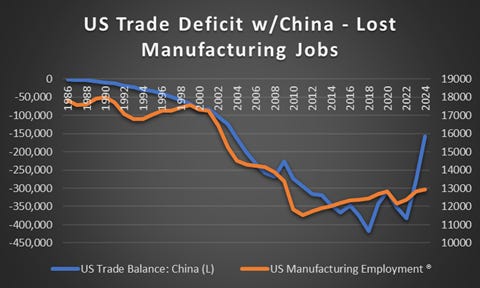
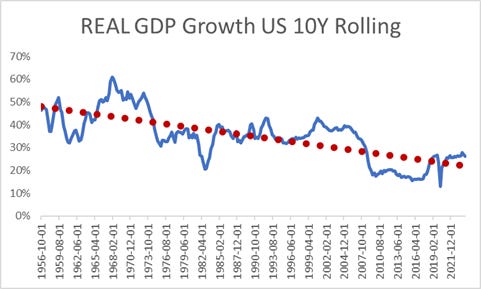
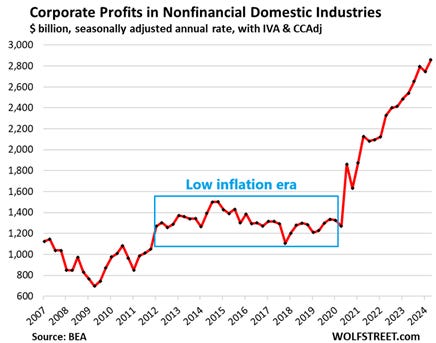
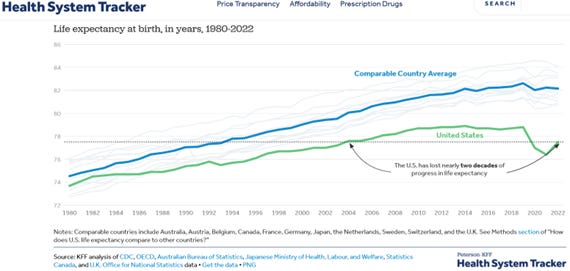
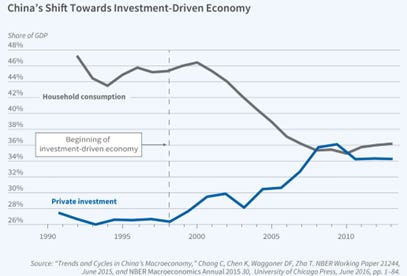
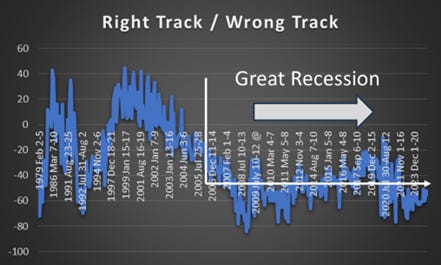
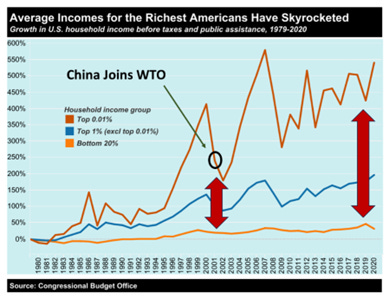
As someone who was in the streets during the Nov. 30, 1999 Battle In Seattle, I find it ironic that it is now the US that is sabotaging WTO by not appointing judges while the Chinese Communist government is the great advocate of free trade. As has been the case when the nation had competitive advantage, the UK and US formerly before they lost it and began to close their doors. The continuity of trade barrier policies from Trump to Biden underscores this. I don’t expect the belated return to industrial policy in the U.S. is going to reverse this.
a great piece - economics heavy or not.
a digression, but
keeping to the topic of capitalist economic policies and consequences - in the real world - not as they are conceived in the metaphysical realm - there's an article by Patrick Bond in Counterpunch - Oct. 3 - "The Blessing" for Genocide: Nearly all BRICS+ Regimes Nurture Israel, Economically - do you have any present or past work in relation to this topic? It would help- people make sense of what country does what and why as genocide unfolds before us.